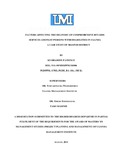Factors affecting the delivery of comprehensive HIV/AIDS services amongst persons with disabilities in Uganda: A case study of Masindi District
Abstract
The study set out to examine the factors affecting the delivery of comprehensive HIV/AIDS services to persons with disabilities in Masindi district. The objectives of the study were to assess; the effect of social- cultural factors, the impact of competence of service providers and the relationship between the modes of service delivery and delivery of comprehensive HIV/AIDS services to persons with disabilities.
The study was guided by the Social Cognitive theory. Pertinent literature from various sources including journals was reviewed to provide insights about the study variables.
A descriptive cross-sectional survey design was used to generate results. Both qualitative and quantitative approaches were used.
The findings revealed a positive correlation between independent and dependent variables which suggests that an improvement in the independent variables leads to delivery of comprehensive HIV/AIDS service amongst PWDs. The hypothesis was tested and the coefficient of all the independent variables was less than the p-value of 0.05 and this led to the rejection of the null hypothesis in favor of the alternative.
From the findings it was concluded that a positive significant relationship existed between the independent variables and the delivery of comprehensive HIV/AIDS services amongst PWDs.
The study recommends that the Social-cultural issues that surround disability and HIV/AIDS should be studied and interventions planned and the government’s action should be more effective and matched with those of National and community-based NGOs. Health providers should be trained in special needs and different agencies should coordinate and needs of PWDs should be included in the development strategies. Disability agencies should also target disability and HIV/AIDS specifically and a closer relationship with NGO/FBOS should be enhanced.

